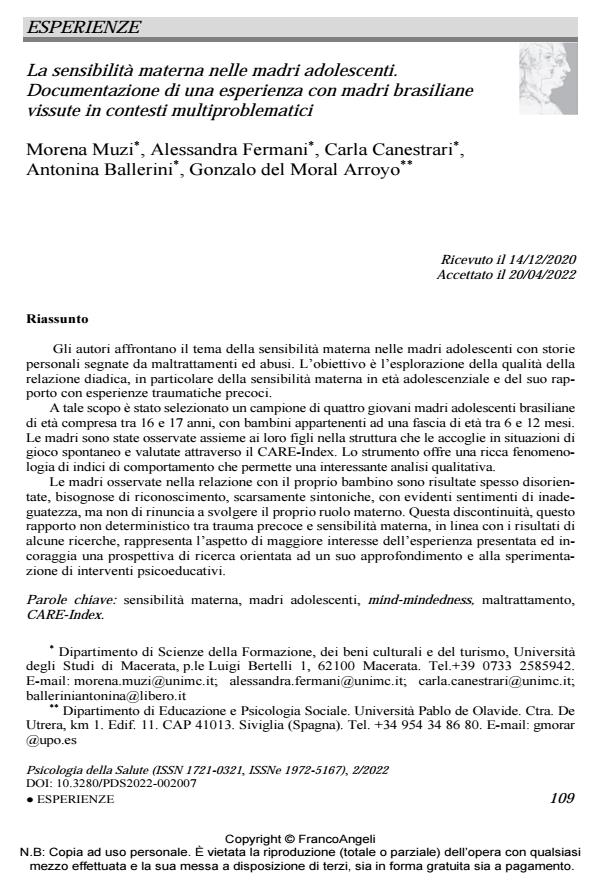Maternal sensitivity in adolescent mothers. Documentation of an experience with Brazilian teenage mothers lived in multi-problematic contexts
Journal title PSICOLOGIA DELLA SALUTE
Author/s Morena Muzi, Alessandra Fermani, Carla Canestrari, Antonina Ballerini, Gonzalo del Moral Arroyo
Publishing Year 2022 Issue 2022/2
Language Italian Pages 20 P. 109-128 File size 278 KB
DOI 10.3280/PDS2022-002007
DOI is like a bar code for intellectual property: to have more infomation
click here
Below, you can see the article first page
If you want to buy this article in PDF format, you can do it, following the instructions to buy download credits

FrancoAngeli is member of Publishers International Linking Association, Inc (PILA), a not-for-profit association which run the CrossRef service enabling links to and from online scholarly content.
The authors address the issue of maternal sensitivity in adolescent mothers who are victims of mistreatment and abuse. The purpose of the study is to explore the quality of the dyadic relationship; in particular, the quality of maternal sensitivity in adolescence and its relationship with early traumatic experiences. For this purpose, the research team was selected a sample of 4 young Brazilian adolescent mothers aged between 16 and 17 years, with children aged between 6 and 12 months. The mothers were observed together with their children in spontaneous play situations and evaluated through the CARE-Index. The tool offers a interesting phenomenology of behavior indices that allows an relevant qualitative analysis. The mothers, observed in the relationship with their child, were often disoriented, in need of recognition, not attuned, with evident feelings of inadequacy, but not of renouncing to play their maternal role. This discontinuity, this non-deterministic relationship between early trauma and maternal sensitivity, represents the most interesting aspect of the experience presented, favors a deepening of the issue and an experimentation of psychoeducational interventions.
Keywords: maternal sensitivity, adolescent mothers, mind-mindedness, maltreatment, CARE-Index.
Morena Muzi, Alessandra Fermani, Carla Canestrari, Antonina Ballerini, Gonzalo del Moral Arroyo, La sensibilità materna nelle madri adolescenti. Documentazione di una esperienza con madri brasiliane vissute in contesti multiproblematici in "PSICOLOGIA DELLA SALUTE" 2/2022, pp 109-128, DOI: 10.3280/PDS2022-002007